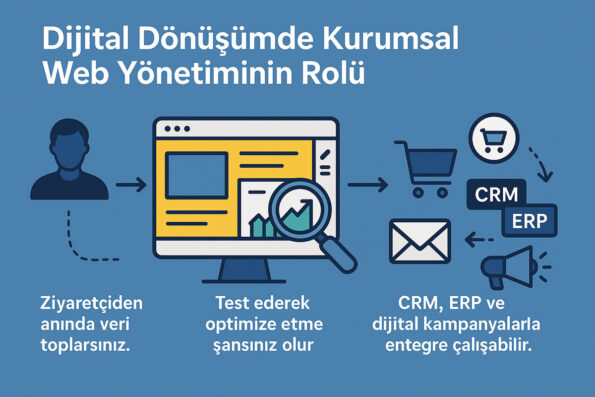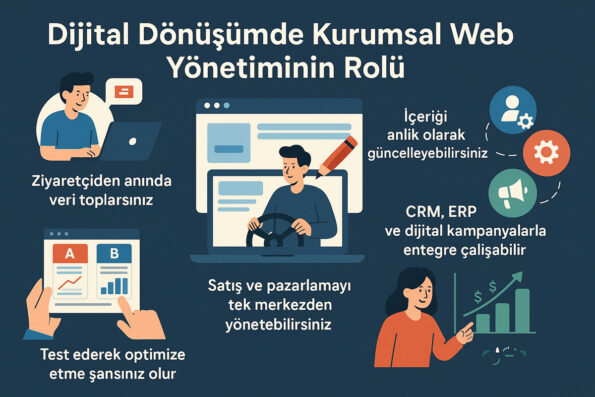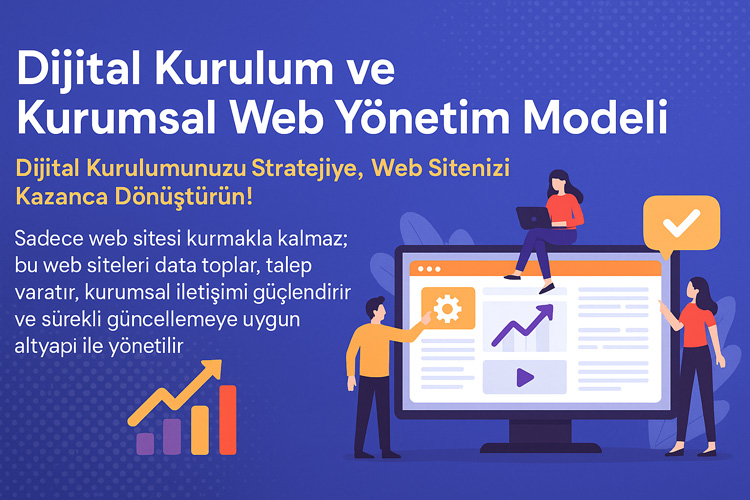Digital transformation and corporate web management have long been perceived as merely a “technological innovation”. However, today the meaning of this concept is much broader: Transformation means adapting all the building blocks of the business to the digital world, digitizing the processes and managing them sustainably.
At this point, there is an area that is most overlooked but is actually the main carrier of this entire process: Corporate Web Management
The corporate website is not the digital showcase of the business, but its strategic management panel.
Businesses that manage this panel regularly produce data, collect demand, gain customers, make decisions and constantly develop. Businesses that do not manage lose their potential without being able to monitor it.
Digital transformation begins not with digitalized processes, but with managed processes.
The website is the center of this.
The Digital Installation and Corporate Web Management Model developed by Adapte Dijital enables businesses to not only exist in the digital world, but also to transform this existence into a measurable, sustainable and effective structure. In this article, we will discuss the role of corporate web management in digital transformation in all its dimensions.

İçindekiler
Toggle1. Corporate Website: The Digital Organism at the Heart of Transformation
A website is not only a digital space, but also the organic communication system that a business establishes with the outside world.
In addition to its duties such as introducing products, explaining services, establishing communication and building trust; now, it also takes on strategic roles such as producing data, analyzing demands and contributing to management decisions.
It’s Not Important to Have a Website, It’s Important to Be Managed
Opening a website can be the beginning of your digital existence. But actively managing that site opens the door to digital transformation.
Managing the site means;
- Lack of pricing information,
- Lack of technical documentation,
- Reasons such as inadequacy of CTA can be considered.
Such clues can be analyzed thanks to the website. - That sector special blogs,
- Success stories,
- Can feed the demand by preparing testimonial presentations.
- New content ideas,
- SEO performance analysis,
- Form performance measurements,
- Guides the development of the site by providing visitor analysis.
- Sectoral content calendar
- Video and promotional investments
- Opening new service pages
- Expanding CRM and ERP integrations
- Produces constant demand
- Feeds the sales funnel
- Provides data to management
- Increases brand value
- Records digital development
- Central to marketing strategies
Content Production According to Sectoral Density
When a manufacturing company notices the intense interest in its healthcare sector page,
Adapte Dijital’in 10 yıllık deneyimiyle geliştirilen bu model, kurumsal web sitenizi sadece tasarlamakla kalmaz;
onu data toplayan, talep yaratan, kurumsal iletişim sağlayan bir dijital yönetim altyapısına dönüştürür.
Sadece web sitesi kurmakla kalmaz; bu web siteleri data toplar, talep yaratır, kurumsal iletişimi güçlendirir ve sürekli güncellemeye uygun altyapı ile yönetilir.
Digital Campaign and Advertising Decisions
Google Ads and LinkedIn campaigns should be planned according to the sector from which the most visitors come.
The data that the ads carry to the site shows which keywords work better.
Digital Monitoring of the Sales Funnel
Visitor > Content > CTA > Form > CRM > Offer
This journey should be followed completely and intervened where it is blocked.
Web management provides continuous maintenance and guidance to this funnel.
Digital Installation and Corporate Web Management Model: Turn Your Digital Installation into Strategy, Your Website into Profit!

6. Continuous Development, Sustainable Digital Transformation
Digital transformation is not a one-time “transformation”.
Just like production lines need constant maintenance, renewal and optimization; the website should also be continuously improved.
Monthly Development Plans
Every month, webmasters:
Annual Digital Development Roadmap
Just like an investment plan, digital development should be planned annually.
This plan includes:
Creating Corporate Memory
A website becomes an archive of information over time with published content.
This archive; It is used in processes such as training new employees, creating marketing materials, and informing customers.
This also enables digital transformation to become a corporate reflex.
Digital Agenda: The Company’s Diary Opened to the Outside
While the website produces content for search engines, it also records the messages the organization gives to the outside world.
This “digital agenda” is the strategic history of the company.
Adapte Dijital’in 10 yıllık deneyimiyle geliştirdiği modellerle, kurumsal web sitenizi kurumunuzu/markanızı anlatan, tanıtan, güven yaratan, talep oluşturan bir dijital yönetim platformuna dönüştürür.
Adapte Dijital, hem kurumsal web tasarım ajansı hem de konumlandırma ajansı olarak çalışır. Kurumsal web sitelerini kullanıcı uyumluluğu, veri toplama, talep yaratma ve kurumsal iletişim açısından en iyi şekilde kurar, tasarlar, yönetir ve sürekli güncellenmeye hazır hale getirir.
7. Conclusion: The Website, the Silent Force Behind Conversion
Digital transformation is on the agenda of every company.
But very few carry out this transformation in a planned, measurable and sustainable way.
One of the most important shortcomings is that corporate websites are left ineffective, unmeasured and unmanaged.
However, a well-managed corporate website:
Adapte Digitally developed Digital Installation and Corporate Web Management Model plans, installs and manages all stages of this transformation in accordance with the structure of your business. Our corporate web management customer: Lider System
CTA
Let’s make your digital transformation permanent with website management.
Contact us to establish a system that collects data step by step, grows and transforms.
Our first consultancy meeting is free.
Take action now and manage your digital transformation professionally!
- Updating content,
- Monitoring data,
- Optimizing pages,
- It means shaping according to new goals.
- Outdated content makes a brand look passive.
- Structures with weak SEO value in search results disappears.
- Requests from forms disappear in e-mail boxes.
- Visitor behavior cannot be analyzed, opportunities are missed.
- A website is not an investment, it just becomes a cost.
- You collect data from the visitor instantly.
- You can update the content instantly.
- You have the chance to optimize by testing.
- You can manage sales and marketing from a single center.
- It can work integrated with CRM, ERP and digital campaigns.
- Awareness: Information is provided with website content.
- Interaction: User interaction begins with forms and CTAs.
- Integration: Data is transferred to CRM and ERP.
- Optimization: Improvements are made by measuring which processes are working and which are not.
- Hosting, security, SSL, backup systems
- Page speeds, mobile compatibility, browser compatibility
- Form and plugin controls
- Planning and publishing blog posts
- Editing service pages
- Frequently asked questions, references, announcements
- Google Analytics report analysis
- Page browsing time per visitor
- Form fill rates, page abandonment rates
- How much traffic did each page receive?
- What are the new pages that need to be opened?
- Which headings should be added to SEO?
- Which sector should the content focus on?
- Which product has been viewed how much,
- Which sector has shown more interest,
- Which content has been clicked the most,
provides valuable information such as. - Which product’s production quantity should be increased,
- Which sector-specific offer should be prepared,
- Which content should be increased,
- Creating a new sales channel,
- Appointing new staff,
- It can also affect decisions such as opening a regional dealership.
What Does Corporate Web Management Mean?
Corporate web management; means establishing a system that continuously monitors, analyzes and manages the entire digital face of a business.
This includes not only technical updates, but also multi-layered processes such as content planning, conversion tracking, data management and CRM integration.
What Do Unmanaged Websites Lose?
The First Touchpoint of Digital Transformation: Website
Your visitor, potential customer, investor or partner first searches for you on Google and comes to your website.
This first contact is the most important moment of the conversion process. If your site cannot manage this theme successfully, your digital transformation process is over before it even starts.
Digital Installation and Corporate Web Management Model: Turn Your Digital Installation into Strategy, Your Website into Profit!
2. What is Digital Transformation and Why Should It Start with the Website?
Digital transformation is making business processes efficient, measurable and sustainable using technological tools.
However, this definition remains incomplete. Real transformation; It is a process of harmony that takes place together with the perspectives of the customer, employee and management.
And the first and most powerful tool to establish this harmony in the digital environment: The website.
Advantages of Conversion Starting Through the Website
Corporate Website = Backbone of Digital Infrastructure
Many institutions use CRM, but the correct data is not entered into this CRM.
Many institutions advertise, but the page where that ad lands does not work.
Therefore, the website acts as the backbone in conversion.
If this backbone is weak, no system that will be built on it will work.
The 4 Stages of Digital Transformation and the Place of the Website
Digital Investments Made Without a Website
Social media ads, Google Ads investments, email marketing; if it is not supported by a good web infrastructure, conversion rates remain low.
Visitors come but do not stay, cannot find content, cannot take action.
Digital Installation and Corporate Web Management Model: Turn Your Digital Installation into Strategy, Turn Your Website into Profit!

3. Content and Processes of Web Management
The Corporate Web Management offered by Adapte Dijital is not just a technical maintenance service.
It is a data, content and performance management system.
This system is designed and planned specifically for the business with the digital installation.
Technical Management
Content Management
Data and Conversion Tracking
Development Planning
4. Web Management’s Contribution to the Management Team
Digital transformation processes are a subject that not only the IT department but also company management should directly deal with.
Web management facilitates decision-making processes by providing instant and accurate data to managers. Especially for production, sales and business development departments, the website is now an information platform.
Web Reports Used Like an Admin Panel
Data from the website can be used as a decision support tool in weekly and monthly meetings of managers.
These reports,
Impact on Production and Sales Planning
Requests received from the website can show which product is searched more in which sector. This information provides clear answers to the questions,
Insight-Based Administrative Moves
Not only the number of visitors, but also what the visitor does on the page is important. Data such as time spent on the page, form filling rate, sectoral trends, allow managers to,
5. Corporate Web Management: Digital Decision Making with Data Collected from the Website
Web management produces data. When this data is interpreted, it turns into information, and when the information is analyzed, it turns into strategy. This transformation is; is the point where real digitalization begins.
Product Positioning with Visitor Behaviors
If a product page is visited frequently, but the form is not filled;






